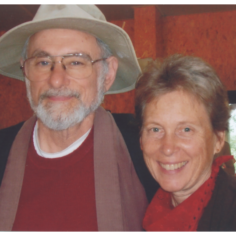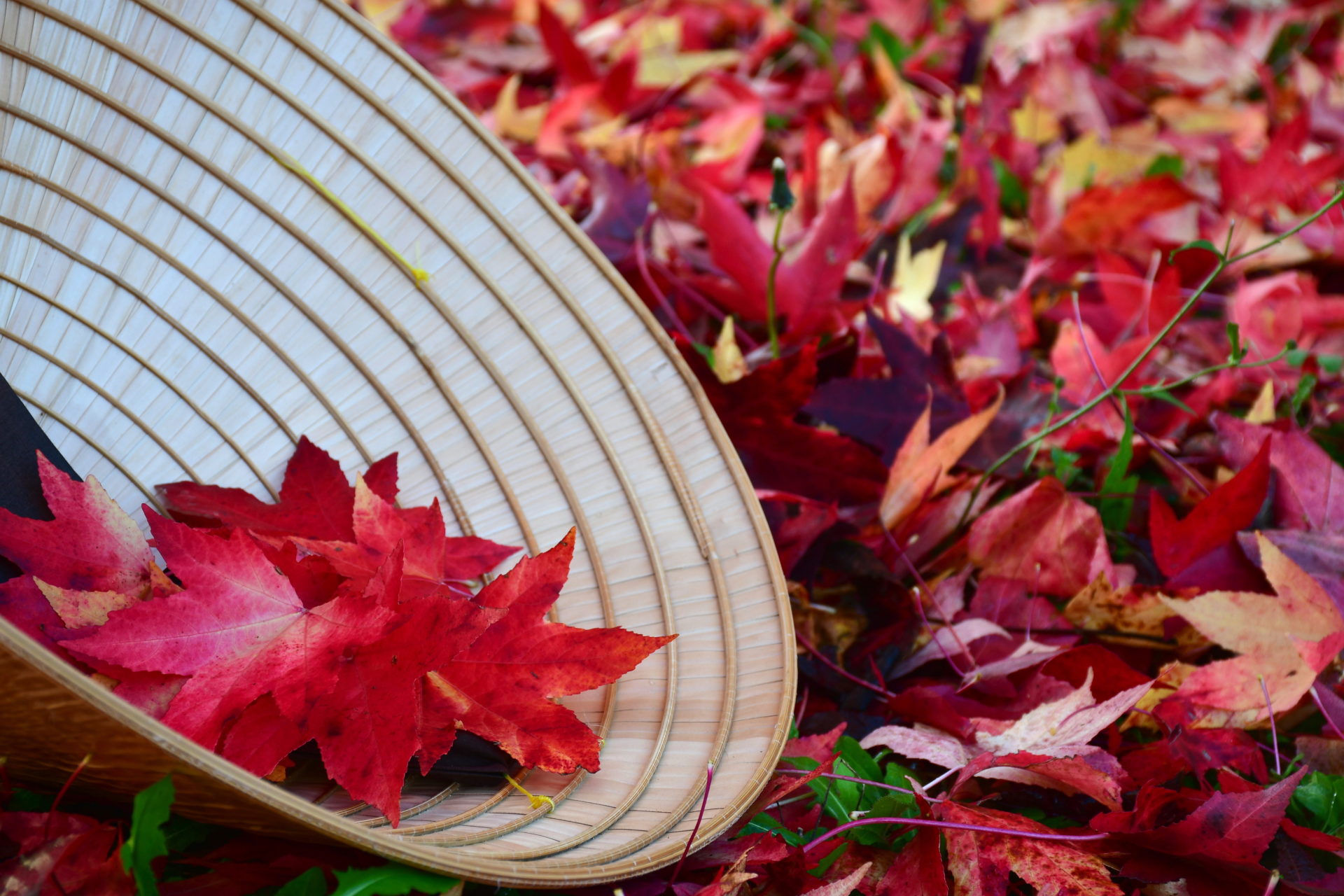At Wake Up Schools, we have been cultivating our heart of gratitude. We connect regularly as Happy Teachers Sangha, and many of us have enjoyed summer retreats and events for teachers. As a community, we have taken time to reflect on the practice energy of Wake Up Schools and how it touches peace, joy, and transformation in ourselves and in others. Teachers were invited to share a story or moment that showed their practice in action.
At Wake Up Schools, we have been cultivating our heart of gratitude. We connect regularly as Happy Teachers Sangha, and many of us have enjoyed summer retreats and events for teachers. As a community, we have taken time to reflect on the practice energy of Wake Up Schools and how it touches peace, joy, and transformation in ourselves and in others. Teachers were invited to share a story or moment that showed their practice in action. The sharings reflect the infusion of mindfulness through our professional lives and the seeds we are cultivating for the future. Some stories are from lockdown, when the fruits of our practice helped us navigate our suffering. Others describe moments of practical support from before the pandemic, helping students with anxiety or frustration.
Listening with Compassion in Lockdown
By Le Thi My Hang
My Hang is a member of An Ban Social Enterprise (Vietnam Wake Up Schools) and has been energetic in creating opportunities to support front-line health care staff and teachers during the pandemic in Vietnam. She shares about planting seeds at the University of Languages and International Studies.
During COVID-19 outbreaks, the Happy Teacher community in Vietnam has been patiently listening to their vocation and keenly responding to others’
aspiration for peace and personal growth.
At the University of Languages and International Studies (ULIS), An Ban Social Enterprise offered our first course in mindfulness to a core team of twenty lecturers in April 2020. We have continued to create practice opportunities since then.
“All members in our group feel so happy and joyful in this happiness journey,” said ULIS Vice Rector Dr. Ha Le Kim Anh. Course participant Dr. Nguyen Thu Le Hang reflected: “Being a regular member of this community of practice has transformed me in a pleasant way. There’s no longer a boundary between me and my students. We have empathy for each other and listen with compassion to each other’s small stories.”
The ULIS core team members have now led five mindfulness workshops for teachers. They are introducing a new course for ULIS students to help them discover the joy and happiness of the practice, as well as to conduct research on the impact of mindfulness.

Mindfulness to Help with Exams
By Richard Brady
Richard is a Dharma teacher and author, and one of the facilitators of Happy Teachers Sangha in the United States. He shares how he supported his high school students during their exams.
In my last years of teaching high school math, I began both of my honors geometry classes with five minutes of mindfulness practice. On days of tests and quizzes, this would take the form of meditation to help the students prepare to do their best.
When the schedule for first-semester exams was announced, I was designated as the proctor for one of my classes, and a colleague was designated as the proctor for the other. The students in the second class were concerned, knowing they wouldn’t have an opening time to meditate. I came up with an alternate form of support, giving each of these students small cards bearing the words “stop and breathe” to put face down on their desks and turn over as needed.
Afterwards, students told me this more than made up for missing out on meditation. Additionally, several students informed me they’d met five minutes before their French exam to sit outside the exam room and meditate together.
A Song to Help Our Temper
By Tineke Spruytenburg
Tineke is a Dharma teacher and one of the facilitators of Happy Teachers Sangha in the Netherlands. She specialises in working with children with special educational needs. She shares a touching moment where a child took refuge in one of our practice songs.
I was teaching six-year-olds in the first grade at a school for children with special educational needs. One of the things I taught them was the song,
“Breathing In, Breathing Out.” Most of the children liked the song, but after a few weeks, they seemed to have forgotten it.
One morning during a swimming lesson, George was trying to complete his laps and was losing his temper. He climbed out of the water and ran to me. “Please, teacher, sing me the song about the breathing—or I will lose my temper!”
I kneeled down and softly sang him the song. When I had finished the last note of “Breathing In, Breathing Out,” George dived into the pool and finished his laps.
Supporting Hearts in Universities
By Yvonne Mazurek
Yvonne supported Wake Up Schools for several years while living in Plum Village France. She shares a moment from lockdown where her practice helped to bridge the distance between students in her online class in Italy.
My partner and I teach at the university level in Italy. One day during the pandemic, when all classes were taking place online, we were saddened when
we heard the radio announce that students at all levels of education were dropping out of school at unprecedented rates. We felt helpless. We talked
about our experiences of online learning and shared our feelings.
That afternoon, I took the first part of class to ask each student about their university experience under lockdown, calling each person in turn by their name. For the first time, they opened up about their lethargy and loneliness, their fears over unemployment and the health of aging family members. I too shared about my sense of confusion and disorientation. After having acknowledged our common vulnerability, we continued class as usual.
This moment of deep listening seemed like nothing. In hindsight, however, I think it represented a shift in our relationship. We felt more connected and finished the semester with a sense of solidarity, trust, and a bit more patience.
Being Truly Present for Each Other
By Ira Anderson
Ira is a Level Two Happy Teacher and facilitator of Happy Teachers Sangha in Berlin, Germany. She shares a moment when her practice helped to generate openness and presence online.
In January, because of the lockdown, I had to teach my classes online. According to school laws, it is up to the students whether they turn their camera on. In most classes, there were almost entirely black windows on my screen. So I felt it was even more important for the class to connect with each other before the actual learning could take place.
Remembering the practice of beginning a sharing circle with an internal weather report, I established the routine of talking about my internal weather before inviting the students to share theirs. This routine helps me to let go of my ideas about what the class should be like. It creates space to share our presence and communicate openly. I’ve continually found that the most fulfilling lessons were not necessarily the most carefully prepared ones, but rather those in which I was truly open and consciously present. That was when the students opened up and shared aspects of themselves and issues they were concerned about.

Tea for Tired Hearts
By Earleen Roumagoux
Earleen is a facilitator of Happy Teachers Sangha and has supported Wake Up Schools for many years. She shares how a moment of ease helped a teacher relax
into openness.
While teaching mindfulness to elementary teachers in Portland, Oregon, my carefully laid out lesson plan listed “Tea Meditation” as our final sharing.
While I prepared for class, laying out the cups and thermos of tea, I was overcome with an urge to do the tea meditation first. But no, that was our last activity. But yes, it felt right. So after our opening meditation, I taught about tea meditation, poured the tea, and enjoyed the quiet warmth it brought.
During our final sharing, one teacher said, “I was so tired that I did not know if I could come or stay at all. But as soon as you poured the tea, the aroma
enlivened my senses. When I held the warm cup, I sighed with relief. With each mindful sip, I relaxed more and more. I enjoyed the whole class.”
She was so content that she revealed what she had been hesitant to disclose before. She had been doing mindfulness practices with her students, but since
mindfulness was new, she didn’t want to let anyone know. Now she felt confident to share that mindful practices were definitely creating happier students and a more positive classroom atmosphere.
Gratitude for This Path
By Miquel Colón Bofill
A member of Happy Teachers Sangha, Miquel is a professor at Institut Cendrassos in Figueres, Spain. Here he expresses his gratitude for the fruits of the practice.
Beloved Thay and Sangha,
I want to express my deep gratitude for what the practice represents in my life. It has brought so much peace and joy. It has been helping me to be collectively present with my inner suffering and transform it into beautiful flowers in the form of deep listening to be offered to my loved ones (family, friends,
colleagues, students).
Thank you dear Thay and Sangha for all the shared wisdom and compassion.
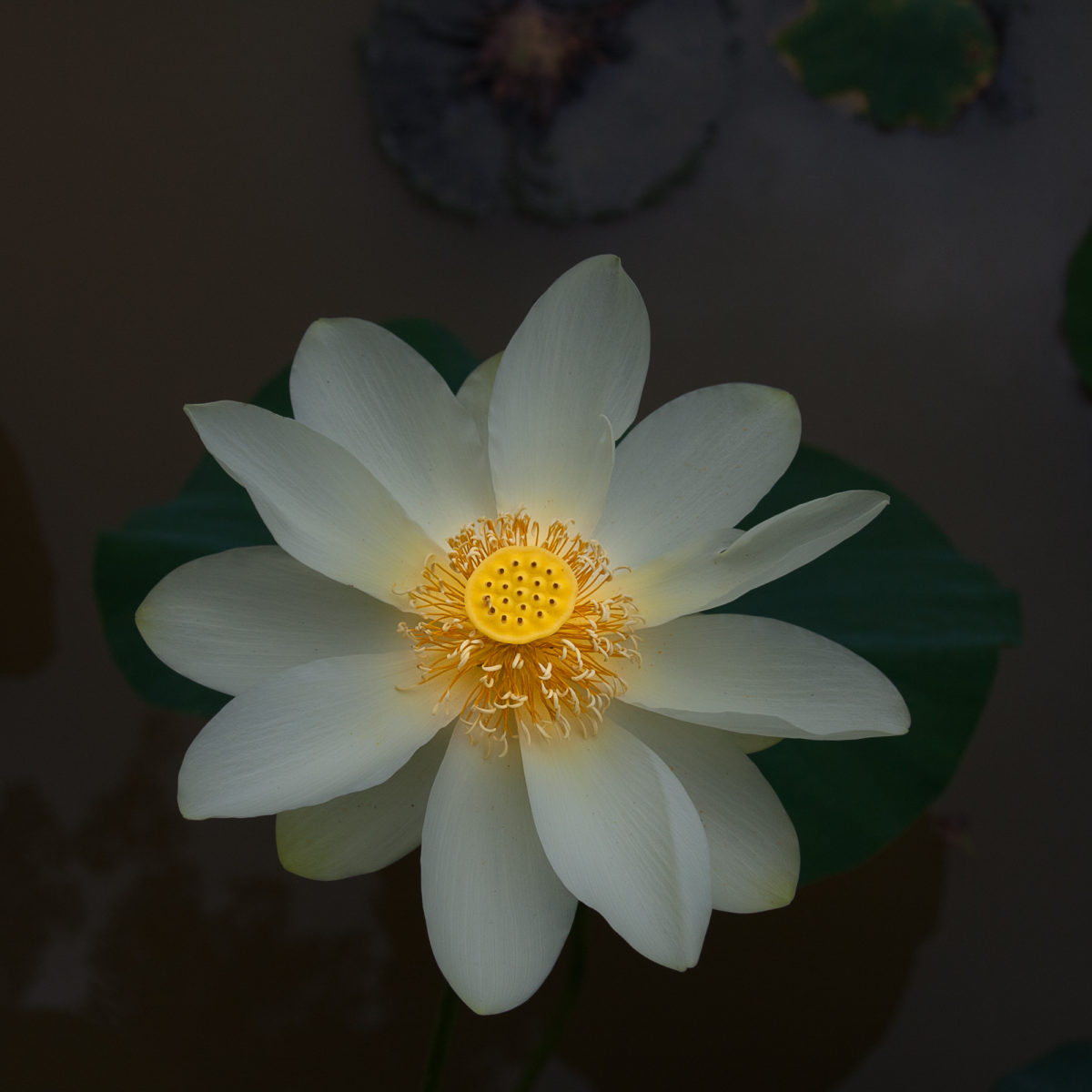
Growing Dreams into Practice Centers
By Lilian Cheung
Lilian is a member of Happy Teachers Sangha; she is Lecturer and Director of Health Promotion and Communication at the Harvard T. H. Chan School of Public Health’s Department of Nutrition in the United States. She shares a moment when Thay’s influence appeared in an unexpected way, and how it inspires her work today.
In 2009, I took our manuscript of Savor: Mindful Eating, Mindful Life and met with my former Chairman, Dr. Walter Willett, at the Department of Nutrition, Harvard School of Public Health. The purpose of the meeting was to ask if he would write an endorsement for us. I was quite nervous because I did not know what he would say when he learnt that my co-author was a Buddhist monk!
In 2009, I took our manuscript of Savor: Mindful Eating, Mindful Life and met with my former Chairman, Dr. Walter Willett, at the Department of Nutrition, Harvard School of Public Health. The purpose of the meeting was to ask if he would write an endorsement for us. I was quite nervous because I did not know what he would say when he learnt that my co-author was a Buddhist monk!
“I know Thich Nhat Hanh,” said Dr. Willett. I was dumbfounded; I really couldn’t believe that at all! He explained, “In 1968, when I was at my medical school in Michigan State University, I invited Thich Nhat Hanh to our campus to speak against the Vietnam War.”
In 2013, Thay was asked to lead a Harvard Medical School meeting on meditation and psychotherapy.” Dr. Willett asked if he could meet Thay again. I managed to arrange for him and his wife Gail to meet with Thay and Sister Chan Khong. It was quite an amazing meeting! Thay is a person of few words, but he did make this comment: “The Harvard School of Public Health should be a mindfulness practice center!” Dr. Willett acknowledged this and said that it would be a matter to be approved by the dean of the school.
Maybe Thay is telepathic, as I am now in the midst of a campaign to see if the Harvard T. H. Chan School of Public Health would not only conduct research on mindfulness but also have everyone in our school–including students, staff, and faculty—learn the scientific basis of mindfulness as well as practice mindfulness as a way of life. I keep dreaming on!
Freedom Online
By Oey Magpantay
Oey is a member of Happy Teachers Sangha. He teaches physical education to grade school students in the Philippines. Here he shares how his practice offers freedom and keeps his joy of teaching well nourished.
I would like to share my gratitude for Thay’s teachings:
Breathing in, I smile
Breathing out, I release
This is a practice of freedom:
Smile
Release
That teaching really struck me. Teaching online is challenging and exhausting. A mixture of pleasant and unpleasant feelings arises in me. I just smile and breathe with my feelings; this really helps to maintain my joy of teaching physical education online.
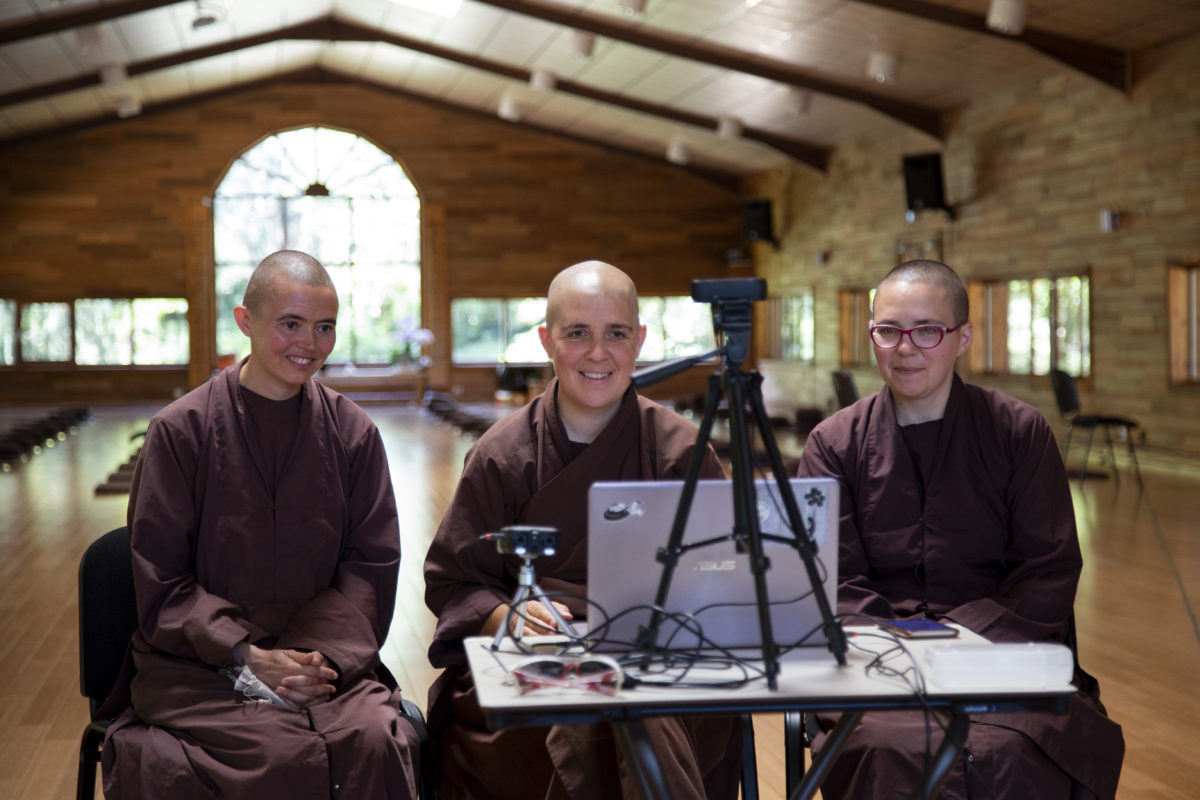
A Joyful Continuation
By Anh-Le Ho-Gia
Anh-Le works in Singapore and Vietnam and teaches mindfulness at Yale-NUS College and other institutions. Here she shares about her work developing Happiness-Based Education Schools in Vietnam.
Four years ago, I had a consultation with Sister Chan Khong in Thailand. I shared that I planned to go back to Central Vietnam—where I come from—and plant the seeds of happiness and well-being in schools. Sister Chan Khong was so happy and said that this was Thay’s dream.
After four years, we now have two preschools and one primary school in full operation. Our key theme is that school is a happy home, a second home. Every day at school is a happy day. Because of the joy and transformation of our students, Happy Schools is now like a movement in Vietnam promoted by the Ministry of Education and Training.
I was so touched by a recent visit of two hundred children from a public preschool. When they arrived, our pupils shared about our school culture, including our mindful clock. Every hour it chimes, and the practice is to stop, put your hand on your abdomen, and count your breath. Then we wave and say,
“Happy!” All the visiting kids with their parents and teachers were able to do that! It was so touching; the kids really got it.
That day our pupils led tours outside. The children walked in the Garden of Love and sat by the Stream of Stillness, watching fish swim. They walked the Path of Happiness and sat on the Hill of Gratitude. They sang “Breathing In, Breathing Out.”
This gives me so much hope. My students are my continuation, and they are sharing the practice in their own way with their energy of mindfulness and loving kindness. The seeds have grown far and wide beyond my imagination. That’s the best part!
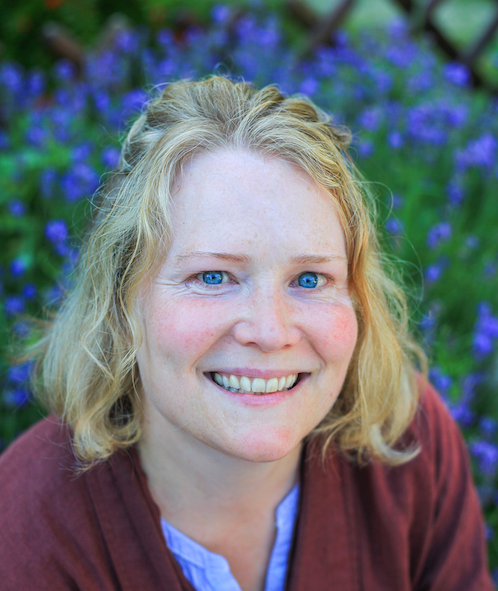
Orla O’Sullivan, True Garden of the Nectar of Immortality, is the international coordinator of Wake Up Schools. She is based in Dublin, Ireland.
